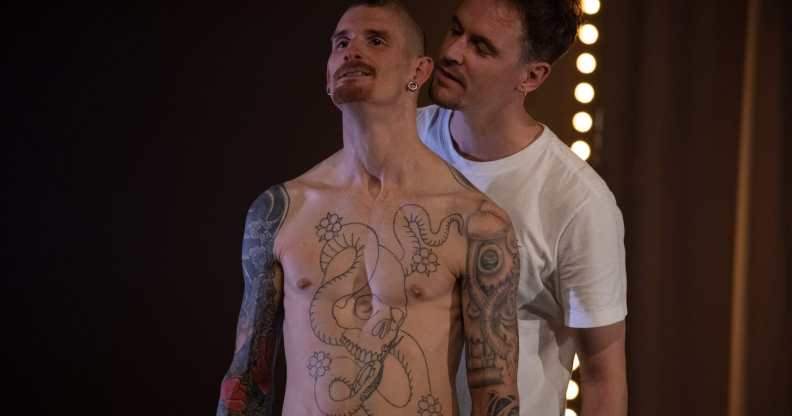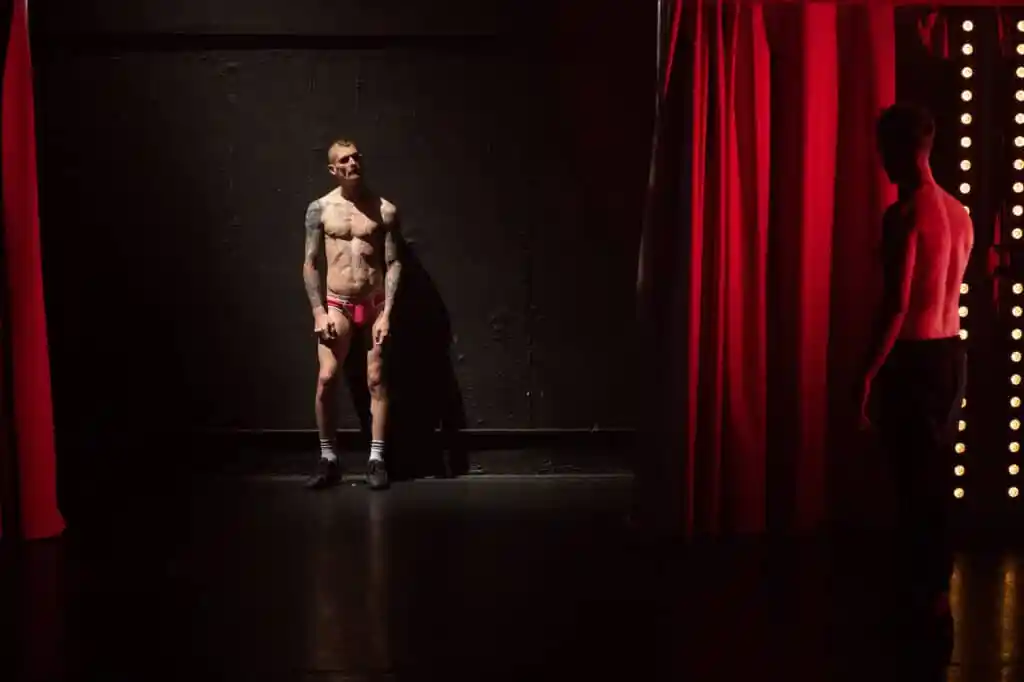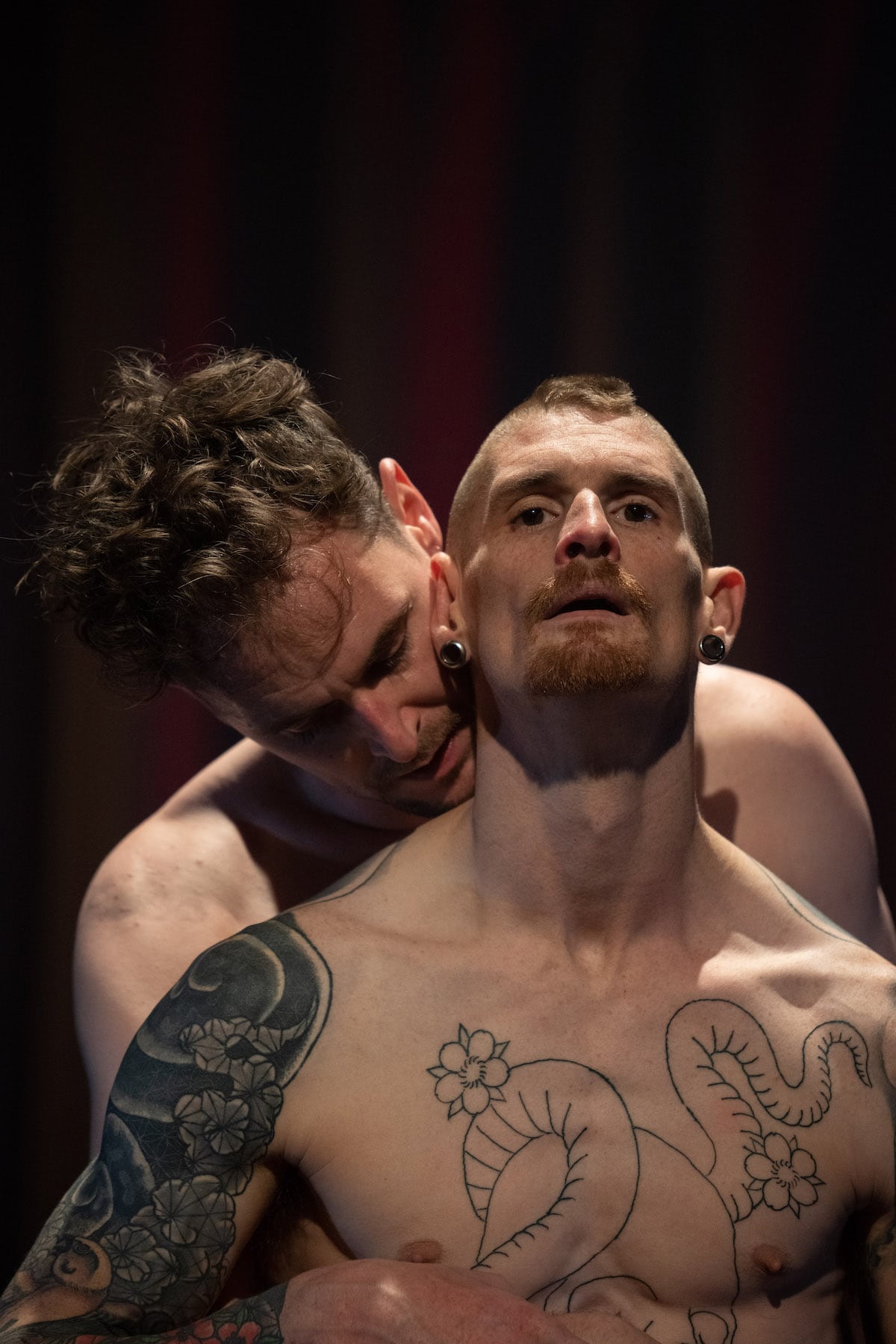Queer, disabled artist Dan Daw on the important lessons kink and fetish can teach us all

Dan Daw and Christopher Owens. (Hugo Glendinning)
Five years ago, the artist and dancer Dan Daw started to wonder why non-disabled people kept telling him he was an “inspiration”.
That led Dan to start thinking critically about “inspiration porn” – a term coined by Stella Young, the late Australian disabled artist and activist– and to creating a powerful piece of theatre all about kink, pleasure and power.
“I realised I was living in the world deeply apologetic about who I was and who I had chosen to be,” Dan tells PinkNews.
“I was living my life for other people instead of living my life for myself. So the show is really about: how do I take up space in the biggest and best way that works for me now? Kink has been a brilliant way that I can do that and take up space in a way where I feel fierce and sexy and unapologetic while I do it.”
Dan has always dabbled in what he calls “kinky practices” – he tried his first harness on when he was around 18 years old, and he realised “quite early on” that he was into leather.

Dan Daw performing on stage in The Dan Daw Show. (Hugo Glendinning)
“There’s the possibility for change and evolution inside of the kink community,” Dan explains.
In the show, Dan explores a sub-dom relationship, with Christoper Owen playing the dom.
“It’s an exploration of: how do I want to be dominated? I’d had brief flickers of being a sub and what that might mean, but creating this show was a way to explore that more deeply.”
Exploring his love of kink and fetish on-stage wasn’t without its challenges.
“It felt like a big step to go from wearing rubber and leather in my bedroom to then wearing leather and rubber out in the world. That was terrifying. So making the show, I was able to create an environment – my ideal environment – for how I want things to be and then make a broader comment on how I’d like things to be in the art world.
It made him realise that the world could learn a thing or two from the kink and fetish communities – where notions of care, interdependence and consent are key.
“What if we applied those principles to each other on a day-to-day basis when we’re doing our shopping or we’re on the tube?”
Dan incorporates those ideas into his show, and the result is a performance that has care for its audience at its core. Those attending The Dan Daw Show are invited to attend in fetish gear – it’s all to do with the kind of space Dan is trying to create, both for himself and for people who come to his shows.
“I always see the performances as an opportunity for the audience to express themselves. It opens up the show a little bit wider and makes sure my audience know that I see them. There’s a monologue at the start where issue an invitation to [the audience] to move around in the space, to leave, come back in. There are trigger warnings in that opening monologue because I want the audience to feel held.”
Some of those attending Dan’s show will have a huge amount of experience wearing fetish gear in public, but for others, it could be their first time doing so. Dan is keenly aware of that fact.
“I’m giving that opportunity to the audience members so that we really start to walk our talk, so the audience can feel invited and included in the narrative we’ve constructed.”

Dan Daw and Christopher Owen in The Dan Daw Show. (Hugo Glendinning)
Also central to The Dan Daw Show is accessibility. All performances are captioned, while one upcoming slot will be sensory adapted. Why is accessibility so important in theatre?
“Whenever I see a show that has embedded access, I feel seen, I feel included,” Dan says. “I don’t necessarily need it, but I know that people I love – my friends, my family – they need it, so that makes me feel seen, it makes me feel represented.”
It feels like such a political and queer act to have subtitles embedded in every show.
Dan was very clear right from the start that he had to have captions in his show – it was the one thing he refused to compromise on.
“I’m a big believer that audiences who don’t need captioning need to learn how to watch theatre with captions. They manage at the opera when they need subtitles because they’re singing Italian, so they can manage it when they’re seeing a theatre show in English.
“It’s a different level of awareness in the same way that us wearing a mask isn’t for us, it’s to protect other people. It’s about learning that little bit of selflessness when we’re out in the world. That’s why it feels like such a political and queer act to have subtitles embedded in every show.”
They’re also offering pre-show access to anyone who might feel the need to explore the theatre space before the show.
“They might want to see lighting, they might want to hear the music, they might want to go on stage and touch the set, they might want to talk about triggers in the work, they might want to see photos of what we’re wearing in the show.
“For us, it’s about that extra level of care in what we do and how we do it.”
Ultimately, The Dan Daw Show is a celebration of the freedom Dan has found in his relationship with his body.
“At its core it’s a work based on care and how we care for each other in the world,” Dan says. “It speaks to interdependence, it speaks to allyship in a beautiful way, and it talks to my internalised ableism that I’ve held for years and that I’m still processing. There’s a lot there in terms of what buttons the show pushes, but ultimately it’s a show about me standing up and saying: ‘This is the person I want to be now.'”
The Dan Daw Show is at Battersea Arts Centre 27 April – 3 May. All tickets are pay what you can. All performances are captioned and relaxed, so you can leave and come back at any point, use the chill out room, tic, stim and make noise if you need to, and use provided ear defenders. To purchase tickets, visit bac.org.uk.

